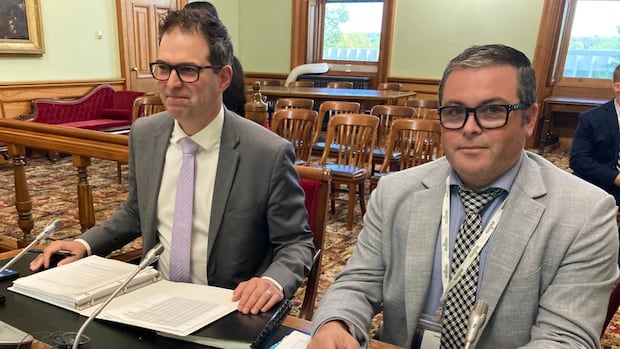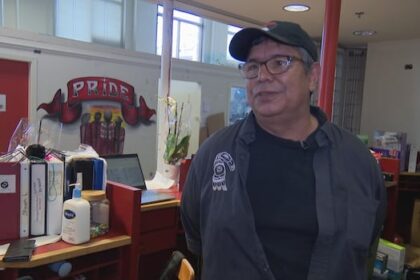New BrunswickSenior provincial officials who oversee the management of New Brunswick’s publicly owned forests failed to explain Tuesday why they have yet to fully implement four-year-old recommendations on the use of the herbicide glyphosate.Department staff grilled over why ideas from a 2021 all-party report still aren’t in placeJacques Poitras · CBC News · Posted: Sep 09, 2025 4:05 PM EDT | Last Updated: 2 hours agoCade Libby, the deputy minister of natural resources, and Chris Norfolk, acting assistant deputy minister, answered questions Tuesday about why the department hasn’t fully acted on a four-year-old glyphosate report. (Jacques Poitras/CBC)Senior provincial officials who oversee the management of New Brunswick’s publicly owned forests failed to explain Tuesday why they have yet to fully implement four-year-old recommendations on the use of the herbicide glyphosate.Green Party MLA Megan Mitton said she was frustrated that several ideas agreed to by all political parties in a November 2021 report were still lagging.”There were timelines on them for six months or 12 months, and we’re like almost four years out and some of these items are just being completed now or are just underway now,” Mitton said.She was speaking at a meeting of the legislature’s committee on climate change and environmental stewardship, which drafted the 2021 report.One recommendation, for a study on the costs and benefits of eliminating the use of glyphosate, was supposed to be done within 18 months of the 2021 report.But officials said Tuesday it won’t be ready until March 2027, five and a half years after the original recommendation.”That is just such a long period of time,” Mitton said.”This is something that’s really important to New Brunswickers, and it was important to this committee and this legislature, so I’m expressing frustration that things have moved pretty slowly on this file.”Green MLA Megan Mitton questioned the delay, saying that glyphosate is an important issue to New Brunswickers. (CBC)Cade Libby, the deputy minister at the Department of Natural Resources, didn’t explain the delay other than to say that “unfortunately, things do take time” and the department “prioritized as best we can” the committee’s recommendations.”The point is well taken in terms of your view on the importance of these, and moving forward with them,” he said of the cost-benefit study.”We still want to proceed with it. It’s just going to take a little bit longer than expected.”WATCH | An all-party committee wanted stricter rules on glyphosate. Some rules have yet to change: Questions linger over slow pace on herbicide recommendationsFour years after a report from an all-party committee on the use and further study of glyphosate and other herbicides, the Department of Natural Resources has yet to complete several recommended steps.Even the department’s minister, John Herron, acknowledged to reporters that “four years seem to be a long time at a high level. … You should be able to do an awful lot in four years.”Caroline Lubbe-D’Arcy, the chair of the activist group Stop Spraying NB, said the delay is “kind of crazy,” given Premier Susan Holt instructed five of her ministers in their mandate letters last fall to act on glyphosate.Holt’s letters to ministers of natural resources, environment, health, energy and agriculture instructed them to “investigate alternatives to pesticide and herbicide use and re-evaluate the safety of glyphosate with new and comprehensive data specific to New Brunswick.”That wording matched the phrasing in the 2024 Liberal election campaign platform.”They just have dropped the ball on it,” said Lubbe-D’Arcy, whose group issued its annual herbicide “report card” Tuesday and awarded the Liberals an F.”There’s just not action on those items … It feels like they’ve backpedalled on it for sure.”Last year, New Brunswick Premier Susan Holt said she’d be willing to ban glyphosate if a link were proven to a purported cluster of neurological symptoms in the province. (Mrinali Anchan/CBC)The Nov. 2, 2021, recommendations were agreed to by MLAs from four parties: the PCs, Liberals, Greens and People’s Alliance.The PC ministers of environment and natural resources were part of the committee and signed off on the report.In June, officials from the Environment Department heard some of the same criticisms on recommendations they were responsible for. They responded that some of the proposals were complex and based on a misunderstanding of existing rules.Glyphosate has been a controversial political issue for years, with Liberal and Progressive Conservative governments refusing to heed pressure to ban it.Those governments have cited Health Canada’s conclusion that the chemical is safe if it’s applied properly.In 2021, J.D. Irving Ltd. co-CEO Jim Irving told the committee that a ban on the herbicide would be “disastrous” for his company’s forestry operations.N.B. Power announced earlier this year that it would stop using glyphosate to clear brush under its transmission lines.But the utility continues to use other herbicides.Mitton pointed out the 2021 report didn’t specify glyphosate alone in its recommendation that the province ask the utility to stop spraying.Libby said the terms glyphosate, herbicide and pesticide are often used interchangeably.”Perhaps there was some, I don’t know — confusion would be the word — but you know, a misunderstanding in terms of what the context was for that particular recommendation,” he said.The department also hasn’t established or expanded buffer zones, or setbacks, between sprayed areas and homes, watercourses and protected natural areas.Chris Norfolk, the acting assistant deputy minister, told the committee that the department concluded that those setbacks “would create a significant impact to the province’s timber supply,” hurting forestry companies. Herron told reporters he was open to talking about larger setbacks to address “a social concern,” which he defined as political objections not based in science.Last year, Holt said she’d be willing to ban glyphosate if a link could be proven to a purported cluster of neurological symptoms in the province.Lubbe-D’Arcy said this was “probably a pretty safe promise for her to make because I’m really not sure there’s ever going to be a connection made.” The provincial officials told the committee that only 15,200 hectares of Crown forests — or 0.5 per cent of the total — are sprayed every year, and conservation areas have been increased and will be increased again. The 2021 recommendations included the re-creation of a Crown Lands and Forest Advisory Board to provide a “diversity of expertise” to the department.That was supposed to happen within six months.Libby said Tuesday that members have been appointed, and the board will hold its first meeting next month.ABOUT THE AUTHORJacques Poitras has been CBC’s provincial affairs reporter in New Brunswick since 2000. He grew up in Moncton and covered Parliament in Ottawa for the New Brunswick Telegraph-Journal. He has reported on every New Brunswick election since 1995 and won awards from the Radio Television Digital News Association, the National Newspaper Awards and Amnesty International. He is also the author of five non-fiction books about New Brunswick politics and history.
Glyphosate recommendations ‘take time,’ provincial officials tell MLAs











